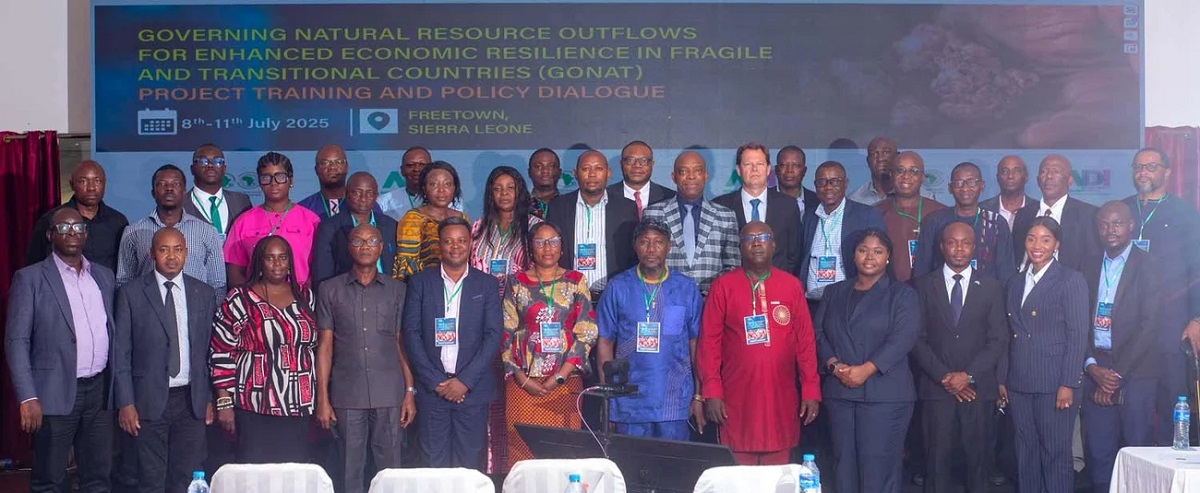Sierra Leone blueprint on tackling Africa’s $90 billion illicit financial flows
- Sierra Leone proposes establishing national communities of practice, implementing institutional reforms, and enhancing transparency in resource-backed lending.
- Experts agree that RBLs, often used to leverage natural resources for loans, should be a last resort, employed only with maximum transparency and tied to investments that bolster repayment capacity.
Sierra Leone is taking decisive action to stem the $90 billion hemorrhage Africa suffers annually from illicit financial flows, partnering with the African Development Bank (AfDB) to fortify natural resource governance.
In a forum that convened over 70 stakeholders from government, civil society, the private sector, and international organizations, Sierra Leone is charting a path toward transparency and economic resilience.
The dialogue, themed “Harnessing Africa’s Wealth: Curbing Illicit Financial Flows for Resilient Growth and Development,” produced actionable policy recommendations to safeguard the continent’s natural wealth.
Sierra Leone leads a collaborative push for reform
The forum, held in Freetown, brought together a diverse coalition to address one of Africa’s most pressing economic challenges: illicit financial flows (IFFs). Participants proposed establishing national communities of practice, implementing institutional reforms, and enhancing transparency in resource-backed lending (RBL).
They agreed that RBLs, often used to leverage natural resources for loans, should be a last resort, employed only with maximum transparency and tied to investments that bolster repayment capacity.
“This initiative can help us improve revenue from natural resources by blocking leakages through illegal natural resource trade and improved management of resource-backed lending,” said Sierra Leone’s Finance Minister, Sheku Ahmed Fantamadi Bangura, highlighting the urgency of reform.
Deepening governance through expertise
Workshop sessions delved into identifying IFF patterns, managing RBLs, and developing transparent governance mechanisms. Participants reviewed the Sierra Leone Country Diagnostic Report, which exposed gaps in institutional capacity and illegal natural resource trade.
International expert Bernd Schlenter from Rand Sandton Consulting Group provided technical insights, offering policy recommendations to curb IFFs. The sessions, enriched with practical case studies, fostered collaboration and equipped stakeholders with tools to strengthen oversight and accountability in resource management.
Aligning with a broader vision
The initiative, part of the AfDB’s Governance of Natural Resources and Transparency (GONAT) Project, aligns with the Bank’s Ten-Year Strategy (2024–2033) and its Natural Resources Management and Investment Action Plan (2025–2029).
Funded by the AfDB’s Transitional Support Facility, the GONAT Project rests on three pillars: policy analysis and diagnostics, capacity strengthening, and high-level policy dialogue.
“Achieving transparent and equitable natural resource management is not merely a technical exercise—it is a strategic imperative for Africa’s future,” said Dr. Eric Ogunleye, Director of the AfDB’s African Development Institute. Halima Hashi, AfDB Country Manager for Sierra Leone, emphasized the project’s role in optimizing the nation’s natural wealth for inclusive prosperity.
Crafting a path forward
The forum’s outcomes are poised to have lasting impact. Participants drafted a communique for national adoption, committing to transform policy recommendations into concrete reforms.
These include fostering communities of practice to sustain dialogue, reforming institutions to close governance gaps, and prioritizing transparency in financial dealings tied to natural resources. By addressing the systemic issues highlighted in the Country Diagnostic Report, Sierra Leone aims to curb illegal trade and enhance revenue retention, setting a model for other African nations.
A model for Africa’s economic resilience
Sierra Leone’s efforts signal a broader movement across Africa to reclaim wealth lost to illicit financial flows. The $90 billion annual loss undermines development, but initiatives like the GONAT Project offer hope.
By building local expertise and fostering cross-sector collaboration, Sierra Leone is laying the groundwork for a transparent, equitable resource economy. The forum’s emphasis on practical solutions—such as robust oversight of RBLs and capacity-building for institutions—positions the country as a leader in this fight.
As Sierra Leone moves to implement these reforms, the collaboration with the AfDB underscores the power of partnerships in tackling complex economic challenges. The draft communique, set for national adoption, represents a commitment to actionable change, from enhancing street-level transparency to strengthening institutional frameworks.
With the AfDB’s strategic support, Sierra Leone is not only safeguarding its natural resources but also inspiring a continent-wide push for resilient, inclusive growth. This initiative marks a pivotal step toward an Africa that harnesses its wealth for the benefit of its people.
Read also: South Africa eyes October exit from illicit flows dirty list
Share this content:





Post Comment